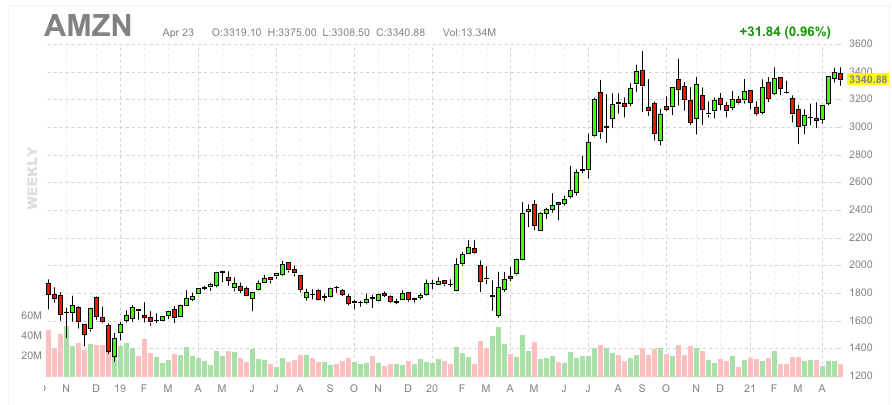Welcome to our 3 new readers of the Scuttlebutt! If you aren’t subscribed and are looking for actionable finance and business knowledge weekly, join us!
The last year of stay at home orders and fiscal stimulus has brought a lot of new people to the stock market. An article from the Wall Street Journal suggested that close to 20% of trading volume came from individual investors last year, a 4% increase from 2019. This is a great thing, especially for young people; I believe that ownership in business(s) will be a key factor in overcoming wealth inequality. For that to happen, those people to need to stick with investing.
In an effort to understand the stock market, I began picking and investing in individual stocks in 2017. I’m still no Warren Buffett, but I have learned a few things since then. There are three lessons in particular I’ve learned that stem from common phrases I’m hearing from new investors. Let’s take a look at each phrase and find out what’s behind it.
“It’s up 1000% in the last week”
The availability and quickness of information we have today’s investing world is often a dangerous thing. Reading stories from famous investors always involved them mailing a company to request their financial information and checking weekly stock prices in the Sunday paper.
Real time access to news and information has sped up the process of price discovery, but it’s also given us screens that look like this.
This day was likely a poor day for the market given every company listed is down large percentages. What’s important here is understanding how this screen makes you feel. Probably pretty bad right? All of your investments are down, surely you must do something?
When you buy stock in a company, you’re buying a real operating business, not just some numbers on a screen. Let’s say you have a lemonade stand that makes $5 a day. A different neighbor comes to you every day and offers you $25 to buy your stand. It’s different neighbors and it’s consistent over time. Then one day a neighbor offers to buy your stand for $100. The very next day a different neighbor offers to buy your stand for $10. Which is correct?
The reality is that the price of a business doesn’t change drastically overnight. What changes is people’s perceptions based on short term indicators like news. You need to decide whether you’re going to be a short term trader or a long term investor. If you’re short term, news about the economy going south is material and will absolutely change your next move. If you’re looking out 5-10 years, the economy news means less to you.
Let’s look at a real example. This is a stock chart for Amazon for the last two years with each month labeled on the bottom of the graph. In March of last year, the price of Amazon fell from roughly $2100 to $1600, a 23% decline. Did the value of Amazon, the business solely focused on delivery that every person used throughout the pandemic, suddenly lose almost a quarter of its value in a few weeks? The market thinks it did - over short term economic news about how the world was ending. Observe the price since that reaction.
When you buy a company based on short term price changes, you’re making a bet that someone will be willing to pay more than you did. The problem with this is that everything has a price where the incremental dollar hits the threshold of “too expensive” and nobody knows where that is. Any person thinking they do is silly (in my opinion).
In my issue You Can Outperform Warren Buffett, I explain why long term investing is the only way to win consistently. There are too many high power forces working against you in short term trading. A long term investing approach allows you to focus on your process in finding good companies and not being lucky. Over time, honing and perfecting this approach will compound and grow your money over time.
Lesson: Don’t use short term signals for long term investment decisions.
"People are saying it's going to XX dollars"
If you read or follow any financial news, you’ve likely seen advertisements for stocks that are going to be “the next Amazon”. You may have also gotten recommendations from friends about a hot stock. The former wants to sell your their stock ideas so they can make money. Your friend wants validation in their idea.
Pictured: Brainwashing, also known as good advertising
I’m not here to bash taking a tip from a friend or paying for advice. What I’m here to point out is the problems that arrive from not doing your own research.
It doesn't matter what you own, there will be drawdowns at some point. Even some of the best companies, like Amazon as we saw above, can go through massive drawdowns based on external factors. The key is to not be scared out of a business because of short term price fluctuations. But how do you do this?
The way to remain steadfast in your holdings and not panic sell is to know what you own. Any person who truly understood the fundamentals of Amazon during the COVID drawdown last year knew that the business would continue to operate and likely even excel during an extended period of staying at home. The fundamentals I’m referring to are things like:
• How much cash does the business have?
• Can they pay their debt?
• If business stops, how long can they operate?
These are all things found on a balance sheet! Here’s an simple example.
Those are only things you would know if you were familiar with the company. You can find these things out by reading the company’s financial statements, listening to the management of the company speak, and by reading this newsletter!
When you take other people’s ideas and buy something without understanding the business, you never gain the conviction to hold that business if it declines 20%. When bad news comes in, you’ll be scared out of it because of questions running through your mind like “What if that person was wrong?”.
Before every buy, do your homework. Understand the business. Have an idea of what it takes for that business to succeed which becomes your thesis. If your thesis holds, you hold. If your thesis breaks or materially changes, then sell.
Lesson: Don’t outsource your conviction
"I've only got $100 on it, it’s no big deal"
As I mentioned before, the digital transformation has brought upside to the financial services space. One way it has materially changed investing is the ability to buy fractional shares. With Amazon trading north of $3000 per share, it would be difficult for a new investor to take part in that business without being able to buy smaller chunks.
A negative side effect of using lower dollar figures to invest is the fallacy it brings; the law of small numbers. It's easy to look at a nominal dollar amount and be okay losing it because you consider it not material or impactful. In finance however, it’s not the dollar amount that is important but the percentage that makes the difference. If you’re curious why percentages are more important, you can read about that in If Saving Money is Wrong, I Don’t Want to be Right.
A dollar is a dollar is a dollar; it doesn’t matter if it’s paying your electric bill, feeding your family, or investing in a business. You are capable of getting a 100% return on a dollar just as easy as a hundred or hundred thousand dollars.
I used to tell myself that when I got to a certain amount of money invested that I would be able to perform better and it would be ‘serious’ at that point. It doesn’t work that way. There isn’t a time or dollar figure where it becomes real; the dollars you invest and the time you put in matters from day one.
Personal finance and investing with nominal dollars is similar to working any job. You don’t enter a job working as the boss. You start out small with little responsibility. Over time, consistently meeting the expectations set for you, leads to more responsibility and before long you’re running the place. Your finance and investing life are no different. If you can’t manage $100 effectively, you won’t be able to manage $100,000.
Lesson: Be diligent with a little so you can be diligent with a lot
Talk next week
~Brock
If you liked what you read and would like something similar in your inbox every Monday, join us!






